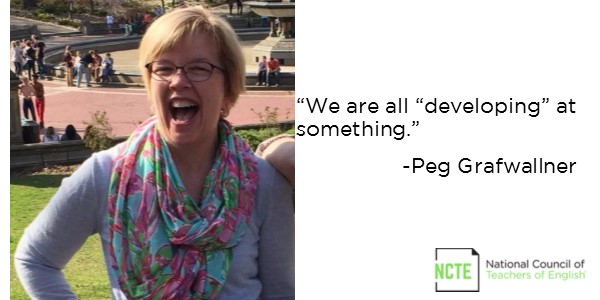This post is written by member Peg Grafwallner.
It’s become a personal quest of mine, something that I repeatedly profess in professional meetings, in presentations, on Twitter, and on my own personal blog.
The terms “struggling” and “reluctant” cannot be allowed to reference readers who need our support. Those terms come from a deficit model of thinking, in which somehow these students will never become the readers we want them to be but, rather, will continually fail according to some district initiated benchmark or criterion.
According to Merriam-Webster’s online dictionary, the term “struggling,” means to “proceed with difficulty or with great effort,” and reluctant means “feeling or showing aversion, hesitation, or unwillingness.” Imagine showing these definitions to a student and explaining that they referred to the student’s reading talent? Of course the student would feel disgruntled and frustrated.
I’ve modified these terms to “developing” because we simply are not there – yet. If I were labeled a “struggling” runner, the idea is that no matter how hard I try, no matter the small bursts of progress I make, the label would become so engrained in who I am that it could actually define me. In truth, I have been progressing at running and while I may (notice the use of the qualifier) never run a marathon, I continue to make gains in my running.
Now imagine explaining to a student that he/she is a developing reader. According to Merriam-Webster’s online dictionary, “developing” means “to acquire gradually.” That’s a definition a student can live with and grow into. It means we can work together for a successful outcome.
So the next time you’re tempted to refer to a student as “struggling” or “reluctant,” please consider eliminating that deficit thinking, and instead, replace with the word, “developing.” In that way, all students will have a chance to proceed, progress, and promote!
Peg Grafwallner is an instructional coach and reading specialist at a large urban high school. Peg draws on her nearly 23 years of experience and expertise to focus on engagement, motivation, and interventions to create student opportunities of learning and inquiry.

